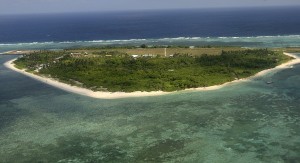5 nations support PH position on sea dispute
The Philippines got backing from five countries in its position on territorial disputes in the West Philippine Sea (South China Sea), a “huge victory” despite China’s fresh refusal to commit to a code of conduct in the sea, Malacañang said Wednesday.
China refused to discuss the territorial disputes during the Asean-China Summit, one of the highest-level meetings during the 21st Association of Southeast Asian Nations (Asean) Summit in Phnom Penh that ended on Tuesday.
But four Asean members claiming territories in the disputed sea—Brunei, Malaysia, the Philippines and Vietnam—agreed to hold talks in Manila on Dec. 12 to see how they could move forward discussions on their territorial disputes with China.
President Aquino, who on Monday publicly rebuked Cambodian Prime Minister Hun Sen on his statement that Asean leaders had agreed not to “internationalize” the disputes, convinced five other leaders on the wisdom of the Philippine position on the issue.
On the President’s intervention, Asean issued a joint communiqué expressing the 10-nation bloc’s desire for a peaceful resolution of the territorial disputes, officials said.
Article continues after this advertisementThe joint communiqué, which did not carry Hun Sen’s statement, was issued at the close of the Asean-Japan Summit in Phnom Penh on Monday.
Article continues after this advertisementAquino’s intervention
In wrapping up Asean’s meeting with Japan, Hun Sen, chairman of the Asean Summit and a close ally of China, said the Asean leaders had reached a consensus that the territorial disputes in the West Philippine Sea should not be “internationalized” and that discussions should be confined between the bloc and China.
Mr. Aquino intervened, saying no such consensus had been reached.
“For the record, this was not our understanding.” Mr. Aquino said. “The Asean route is not the only route for us. As a sovereign state, it is our right to defend our national interest.”
“We made our stand clear to all parties with sobriety, dignity and reason. In the end, we did not only deliver our message; we [also] convinced [no fewer] than five countries to agree with our position,” Mr. Aquino said on his arrival in Manila late Tuesday.
“Before, only two were talking about the importance of the (code of conduct). Now more are saying, ‘It’s about time formal talks on the code of conduct were started to avert tension in the future,”’ he said.
The Philippines, Brunei, Malaysia and Vietnam are pushing for a code of conduct with China to minimize the risk of violent confrontations in the West Philippine Sea, home to major sea lanes vital to global trade and where islets, reefs and atolls are believed to be sitting on vast gas and oil deposits.
China said earlier that it was willing to work on a code of conduct with Asean countries at the proper time, although it doubted whether the regional bloc was the proper forum for discussions on such a code.
Cabinet Secretary Rene Almendras, who accompanied the President to the Asean summit, declined to identify the five countries, saying the discussions happened at the retreat sessions. He said the five were not necessarily members of Asean.
International law
The Philippines stands for the resolution of the maritime disputes with China according to the United Nations Convention on the Law of the Sea (Unclos), which allows coastal states 370 kilometers (200 nautical miles) of exclusive economic zone.
Besides the Philippines, Brunei, Malaysia, Vietnam and Taiwan also claim territory in the sea.
But China insists it has sovereignty over nearly the entire sea and refuses to discuss the overlapping claims with its rivals on any international forum. It insists on one-on-one discussions with the other claimants.
Almendras confirmed that Asean had failed to get any commitment from China on the code of conduct. But he said Foreign Secretary Albert del Rosario would restart talks with his Southeast Asian counterparts soon.
Getting five countries to agree to the Philippine position was a “huge victory” given that it was facing Asia’s economic and military superpower, the President said.
“It was like a David and Goliath fight, but we stood our ground. Otherwise, who else could we turn to? Now they know: the Filipino will not back down if he’s in the right. The Filipino is good at associating with others, but we will not be oppressed,” he said.
Almendras said the exclusion of Hun Sen’s remarks from the postsummit joint communiqué was a “success” on the part of the Philippines.
Trip’s success
“I think, if you were to ask us what was the success of the Asean trip, it was precisely that—that in the final draft, at least the ones that was shown to us, and the ones that explained in the closing ceremony, that particular line that… there was an agreement that ‘South China Sea issues will not be internationalized’ was not included,” Almendras said.
“It’s not the end game. We know that it’s still gonna be a long discussion, long struggle, but at the very least, the Philippine position was made very clear to everyone. And we were very, very happy at the turn out of the support for the Philippine position during the East Asia Summit retreat session,” he said.
Almendras said that US President Barack Obama and other heads of state or government were “very attentive” when Mr. Aquino rose to dispute Hun Sen’s remarks and declared that Asean was not the only route available for the Philippines. With reports from Tarra Quismundo and Michael Lim Ubac
For comprehensive coverage, in-depth analysis, visit our special page for West Philippine Sea updates. Stay informed with articles, videos, and expert opinions.
